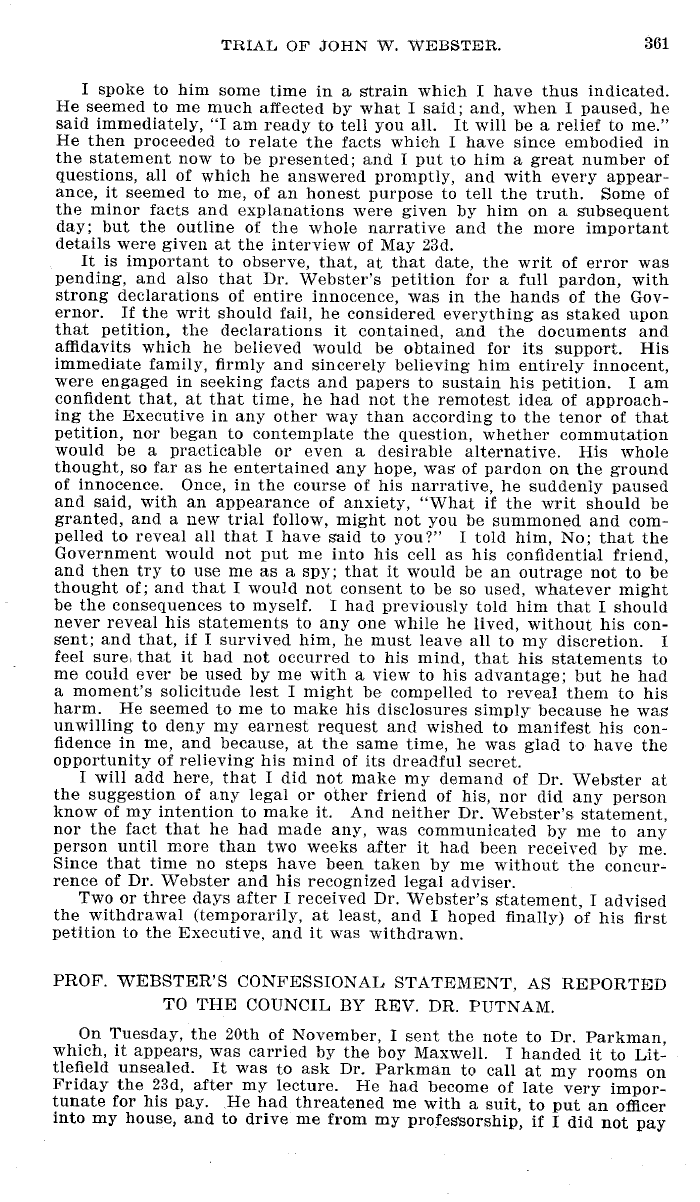|
TRIAL OF JOHN W. WEBSTER. 361
I spoke to him some time in a strain which I have thus indicated.
He seemed to me much affected by what I said; and, when I paused, he
said immediately, "I am ready to tell you all. It will be a relief to me."
He then proceeded to relate the facts which I have since embodied in
the statement now to be presented; and I put to him a great number of
questions, all of which he answered promptly, and with every appear-
ance, it seemed to me, of an honest purpose to tell the truth. Some of
the minor facts and explanations were given by him on a subsequent
day; but the outline of the whole narrative and the more important
details were given at the interview of May 23d.
It is important to observe, that, at that date, the writ of error was
pending, and also that Dr. Webster's petition for a full pardon, with
strong declarations of entire innocence, was in the hands of the Gov-
ernor. If the writ should fail, he considered everything as staked upon
that petition, the declarations it contained, and the documents and
affidavits which he believed would be obtained for its support. His
immediate family, firmly and sincerely believing him entirely innocent,
were engaged in seeking facts and papers to sustain his petition. I am
confident that, at that time, he had not the remotest idea of approach-
ing the Executive in any other way than according to the tenor of that
petition, nor began to contemplate the question, whether commutation
would be a practicable or even a desirable alternative. His whole
thought, so far as he entertained any hope, was of pardon on the ground
of innocence. Once, in the course of his narrative, he suddenly paused
and said, with an appearance of anxiety, "What if the writ should be
granted, and a new trial follow, might not you be summoned and com-
pelled to reveal all that I have said to you?" I told him, No; that the
Government would not put me into his cell as his confidential friend,
and then try to use me as a spy; that it would be an outrage not to be
thought of; and that I would not consent to be so used, whatever might
be the consequences to myself. I had previously told him that I should
never reveal his statements to any one while he lived, without his con-
sent; and that, if I survived him, he must leave all to my discretion. I
feel sure, that it had not occurred to his mind, that his statements to
me could ever be used by me with a view to his advantage; but he had
a moment's solicitude lest I might be compelled to reveal them to his
harm. He seemed to me to make his disclosures simply because he was
unwilling to deny my earnest request and wished to manifest his con-
fidence in me, and because, at the same time, he was glad to have the
opportunity of relieving his mind of its dreadful secret.
I will add here, that I did not make my demand of Dr. Webster at
the suggestion of any legal or other friend of his, nor did any person
know of my intention to make it. And neither Dr. Webster's statement,
nor the fact that he had made any, was communicated by me to any
person until more than two weeks after it had been received by me.
Since that time no steps have been taken by me without the concur-
rence of Dr. Webster and his recognized legal adviser.
Two or three days after I received Dr. Webster's statement, I advised
the withdrawal (temporarily, at least, and I hoped finally) of his first
petition to the Executive, and it was withdrawn.
PROF. WEBSTER'S CONFESSIONAL STATEMENT, AS REPORTED
TO THE COUNCIL BY REV. DR. PUTNAM.
On Tuesday, the 20th of November, I sent the note to Dr. Parkman,
which, it appears, was carried by the boy Maxwell. I handed it to Lit-
tlefield unsealed. It was to ask Dr. Parkman to call at my rooms on
Friday the 23d, after my lecture. He had become of late very impor-
tunate for his pay. He had threatened me with a suit, to put an officer
into my house, and to drive me from my professorship, if I did not pay
|

